Inheritors of Tiger-head shoes in E China
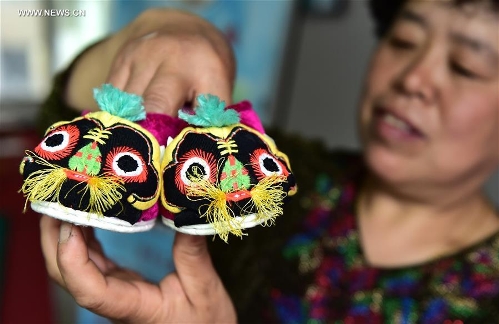
Luo Jihua examine a pair of tiger-head shoes in Bengbu City, east China's Anhui Province, May 20, 2016. Ding Yuan and Luo Jihua, a couple who are inheritors of tiger-head shoes, are recently worried about the future of the handicraft as fewer people would like to carry out the traditional industry. Tiger-head shoes are an example of traditional Chinese folk handicraft used as footwear for children. Their name comes from the toe cap, which looks like the head of a tiger. In Chinese culture, tigers are regarded as auspicious and people embroider the head and the upper of the shoes with tiger or tiger-head patterns in the hope that their children will become as robust and dynamic as tigers. Ding Yuan and Luo Jihua can make about 100 pairs of tiger-head shoes every year, purely handmade. The complex embroidery process of tiger-head shoes has caused fewer people to keep on learning. "It is quite possible that the tiger-head shoes would sink into oblivion with the development of modern shoe-making industry," said the couple. (Xinhua/Liu Jun
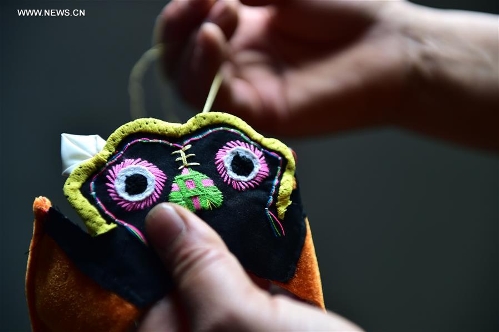
Luo Jihua makes a tiger-head shoe in Bengbu City, east China's Anhui Province, May 20, 2016. Ding Yuan and Luo Jihua, a couple who are inheritors of tiger-head shoes, are recently worried about the future of the handicraft as fewer people would like to carry out the traditional industry. Tiger-head shoes are an example of traditional Chinese folk handicraft used as footwear for children. Their name comes from the toe cap, which looks like the head of a tiger. In Chinese culture, tigers are regarded as auspicious and people embroider the head and the upper of the shoes with tiger or tiger-head patterns in the hope that their children will become as robust and dynamic as tigers. Ding Yuan and Luo Jihua can make about 100 pairs of tiger-head shoes every year, purely handmade. The complex embroidery process of tiger-head shoes has caused fewer people to keep on learning. "It is quite possible that the tiger-head shoes would sink into oblivion with the development of modern shoe-making industry," said the couple. (Xinhua/Liu Jun
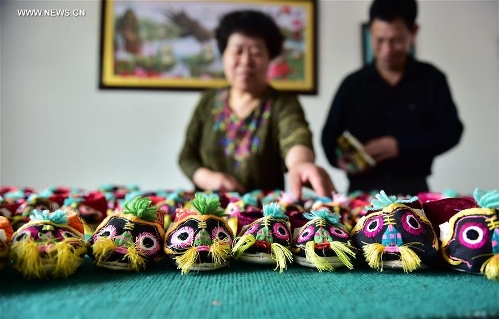
The couple Ding Yuan (R) and Luo Jihua place tiger-head shoes in Bengbu City, east China's Anhui Province, May 20, 2016. Ding Yuan and Luo Jihua, a couple who are inheritors of tiger-head shoes, are recently worried about the future of the handicraft as fewer people would like to carry out the traditional industry. Tiger-head shoes are an example of traditional Chinese folk handicraft used as footwear for children. Their name comes from the toe cap, which looks like the head of a tiger. In Chinese culture, tigers are regarded as auspicious and people embroider the head and the upper of the shoes with tiger or tiger-head patterns in the hope that their children will become as robust and dynamic as tigers. Ding Yuan and Luo Jihua can make about 100 pairs of tiger-head shoes every year, purely handmade. The complex embroidery process of tiger-head shoes has caused fewer people to keep on learning. "It is quite possible that the tiger-head shoes would sink into oblivion with the development of modern shoe-making industry," said the couple. (Xinhua/Liu Jun
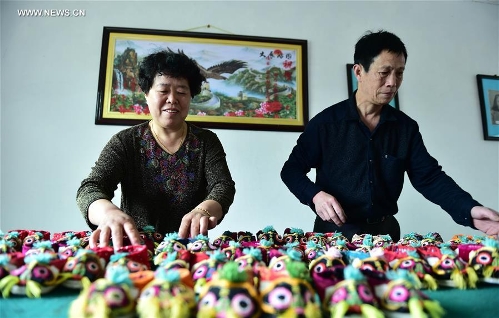
The couple Ding Yuan (R) and Luo Jihua place tiger-head shoes in Bengbu City, east China's Anhui Province, May 20, 2016. Ding Yuan and Luo Jihua, a couple who are inheritors of tiger-head shoes, are recently worried about the future of the handicraft as fewer people would like to carry out the traditional industry. Tiger-head shoes are an example of traditional Chinese folk handicraft used as footwear for children. Their name comes from the toe cap, which looks like the head of a tiger. In Chinese culture, tigers are regarded as auspicious and people embroider the head and the upper of the shoes with tiger or tiger-head patterns in the hope that their children will become as robust and dynamic as tigers. Ding Yuan and Luo Jihua can make about 100 pairs of tiger-head shoes every year, purely handmade. The complex embroidery process of tiger-head shoes has caused fewer people to keep on learning. "It is quite possible that the tiger-head shoes would sink into oblivion with the development of modern shoe-making industry," said the couple. (Xinhua/Liu Jun
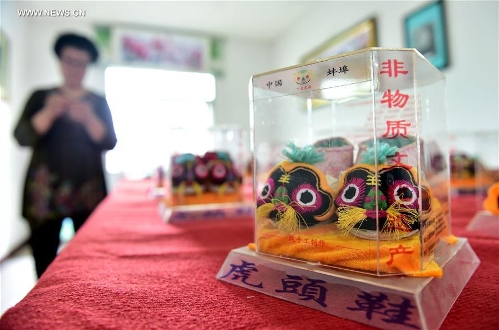
Photo taken on May 20, 2016 shows the tiger-head shoes for sale in Bengbu City, east China's Anhui Province. Ding Yuan and Luo Jihua, a couple who are inheritors of tiger-head shoes, are recently worried about the future of the handicraft as fewer people would like to carry out the traditional industry. Tiger-head shoes are an example of traditional Chinese folk handicraft used as footwear for children. Their name comes from the toe cap, which looks like the head of a tiger. In Chinese culture, tigers are regarded as auspicious and people embroider the head and the upper of the shoes with tiger or tiger-head patterns in the hope that their children will become as robust and dynamic as tigers. Ding Yuan and Luo Jihua can make about 100 pairs of tiger-head shoes every year, purely handmade. The complex embroidery process of tiger-head shoes has caused fewer people to keep on learning. "It is quite possible that the tiger-head shoes would sink into oblivion with the development of modern shoe-making industry," said the couple. (Xinhua/Liu Jun
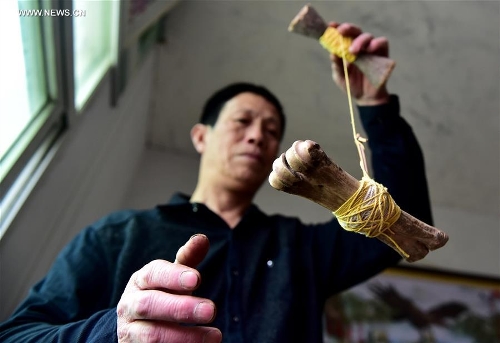
Ding Yuan clears threads used for making tiger-head shoes in Bengbu City, east China's Anhui Province, May 20, 2016. Ding Yuan and Luo Jihua, a couple who are inheritors of tiger-head shoes, are recently worried about the future of the handicraft as fewer people would like to carry out the traditional industry. Tiger-head shoes are an example of traditional Chinese folk handicraft used as footwear for children. Their name comes from the toe cap, which looks like the head of a tiger. In Chinese culture, tigers are regarded as auspicious and people embroider the head and the upper of the shoes with tiger or tiger-head patterns in the hope that their children will become as robust and dynamic as tigers. Ding Yuan and Luo Jihua can make about 100 pairs of tiger-head shoes every year, purely handmade. The complex embroidery process of tiger-head shoes has caused fewer people to keep on learning. "It is quite possible that the tiger-head shoes would sink into oblivion with the development of modern shoe-making industry," said the couple. (Xinhua/Liu Jun
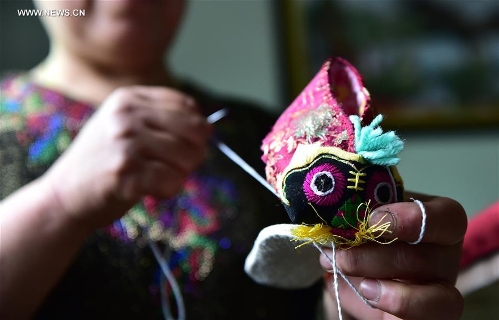
Luo Jihua makes tiger-head shoes in Bengbu City, east China's Anhui Province, May 20, 2016. Ding Yuan and Luo Jihua, a couple who are inheritors of tiger-head shoes, are recently worried about the future of the handicraft as fewer people would like to carry out the traditional industry. Tiger-head shoes are an example of traditional Chinese folk handicraft used as footwear for children. Their name comes from the toe cap, which looks like the head of a tiger. In Chinese culture, tigers are regarded as auspicious and people embroider the head and the upper of the shoes with tiger or tiger-head patterns in the hope that their children will become as robust and dynamic as tigers. Ding Yuan and Luo Jihua can make about 100 pairs of tiger-head shoes every year, purely handmade. The complex embroidery process of tiger-head shoes has caused fewer people to keep on learning. "It is quite possible that the tiger-head shoes would sink into oblivion with the development of modern shoe-making industry," said the couple. (Xinhua/Liu Jun
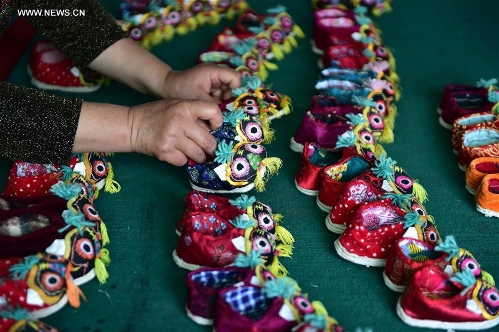
Luo Jihua examines tiger-head shoes in Bengbu City, east China's Anhui Province, May 20, 2016. Ding Yuan and Luo Jihua, a couple who are inheritors of tiger-head shoes, are recently worried about the future of the handicraft as fewer people would like to carry out the traditional industry. Tiger-head shoes are an example of traditional Chinese folk handicraft used as footwear for children. Their name comes from the toe cap, which looks like the head of a tiger. In Chinese culture, tigers are regarded as auspicious and people embroider the head and the upper of the shoes with tiger or tiger-head patterns in the hope that their children will become as robust and dynamic as tigers. Ding Yuan and Luo Jihua can make about 100 pairs of tiger-head shoes every year, purely handmade. The complex embroidery process of tiger-head shoes has caused fewer people to keep on learning. "It is quite possible that the tiger-head shoes would sink into oblivion with the development of modern shoe-making industry," said the couple. (Xinhua/Liu Jun

Luo Jihua examines tiger-head shoes in Bengbu City, east China's Anhui Province, May 20, 2016. Ding Yuan and Luo Jihua, a couple who are inheritors of tiger-head shoes, are recently worried about the future of the handicraft as fewer people would like to carry out the traditional industry. Tiger-head shoes are an example of traditional Chinese folk handicraft used as footwear for children. Their name comes from the toe cap, which looks like the head of a tiger. In Chinese culture, tigers are regarded as auspicious and people embroider the head and the upper of the shoes with tiger or tiger-head patterns in the hope that their children will become as robust and dynamic as tigers. Ding Yuan and Luo Jihua can make about 100 pairs of tiger-head shoes every year, purely handmade. The complex embroidery process of tiger-head shoes has caused fewer people to keep on learning. "It is quite possible that the tiger-head shoes would sink into oblivion with the development of modern shoe-making industry," said the couple. (Xinhua/Liu Jun

Luo Jihua makes tiger-head shoes in Bengbu City, east China's Anhui Province, May 20, 2016. Ding Yuan and Luo Jihua, a couple who are inheritors of tiger-head shoes, are recently worried about the future of the handicraft as fewer people would like to carry out the traditional industry. Tiger-head shoes are an example of traditional Chinese folk handicraft used as footwear for children. Their name comes from the toe cap, which looks like the head of a tiger. In Chinese culture, tigers are regarded as auspicious and people embroider the head and the upper of the shoes with tiger or tiger-head patterns in the hope that their children will become as robust and dynamic as tigers. Ding Yuan and Luo Jihua can make about 100 pairs of tiger-head shoes every year, purely handmade. The complex embroidery process of tiger-head shoes has caused fewer people to keep on learning. "It is quite possible that the tiger-head shoes would sink into oblivion with the development of modern shoe-making industry," said the couple. (Xinhua/Liu Jun